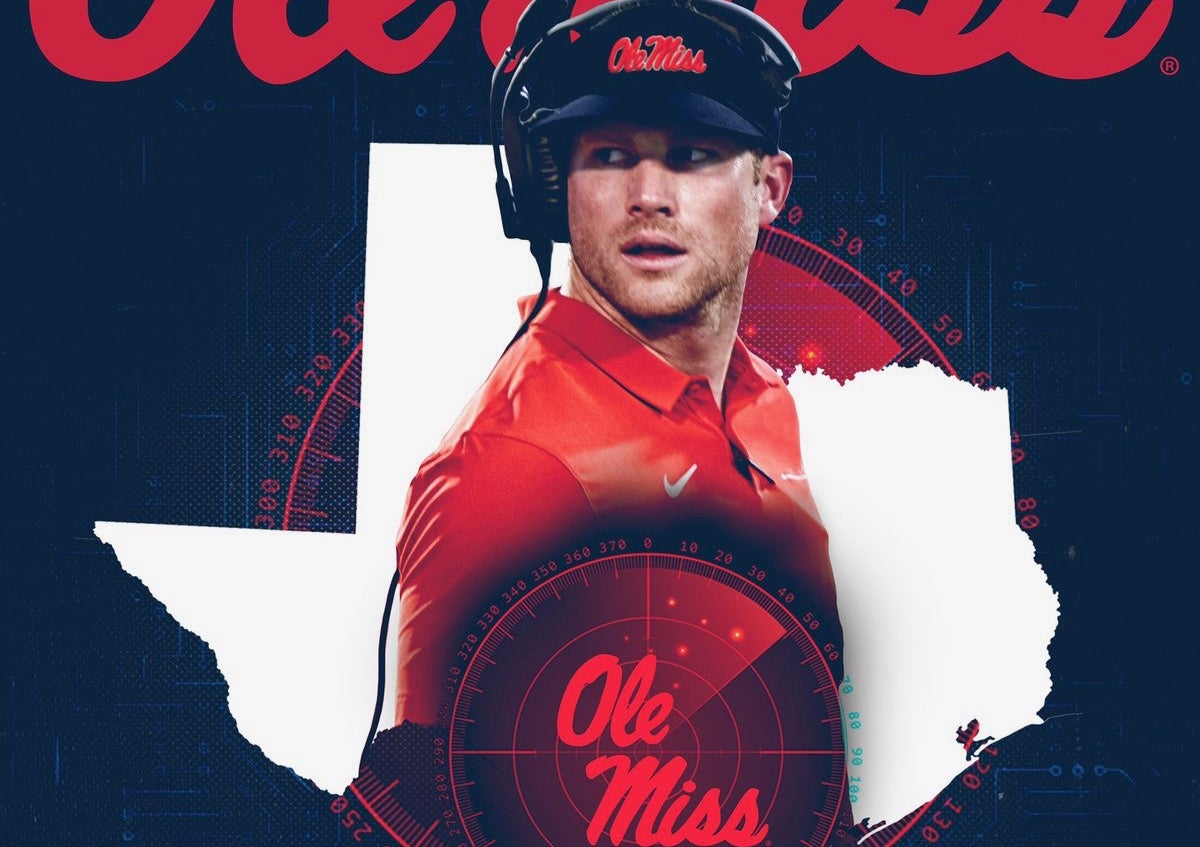
- catfishboy
- Administrator
 Offline
Offline 
- Registered: 8/01/2017
- Posts: 6,868
Blake Gideon: Ole Miss special teams all about mindset
Blake Gideon: Ole Miss special teams all about mindset
Ole Miss first-year special teams coordinator Blake Gideon stopped by Reb Talk with voice of the Rebels, David Kellum, this week to discuss a wide range of topics, from his approach to special teams, to the his relationship with Lane Kiffin, recruiting and more. Here’s everything he had to say …
On when he knew he wanted to become a coach following a decorated, four-year starting career at Texas: The people that say that, I think that’s just a nice way of saying I wasn’t nearly as fast as I should have been, wasn’t nearly as athletic as I should have been. I have always enjoyed the mental part of the game. When coaches first get into the business, you talk about how addicting it is, the strategy part of things. I enjoy learning new ways to do things. What helped me along, really, was my dad was a long-time high school coach in the state of Texas. Growing up in a household of teachers, my mom was a high school math teacher. That’s really what (coaching) is. It’s a profession of teaching. That’s what I fell in love with, is having the opportunity to stand in front of some guys and grow them to a final product and going through all the ups and downs of that and getting the guys to trust you.
On drawing from his playing career to relate to players: I think when I’m talking to guys about the things we’re asking them to do, I’m coming at it from experience, right? I have the luxury of telling guys, ‘Hey, I’m never going to ask you to do something I haven’t done myself.’ I know there’s some jobs in the game of football that aren’t near as fun out on the field; that you may been seen as a little bit of a sacrificial lamb to go take out this block or make this block for one of your teammates to experience the headline play. I think it validates you a little bit more. Those guys are hearing from somebody that experienced the same pain, experienced the same not-fun part of summer conditioning and the winter runs whenever it’s really cold in the mornings still. It validates (you) when you’re asking them to do those hard, not-so-fun things.
On his relationship with Lane Kiffin and the decision to come to Ole Miss: We had some mutual associates. Football coaching, especially in college, is such a small world. It’s a small fraternity. What I’ve learned is there’s really about four or five ways of doing things. Of all the hundred and whatever Division I programs, there’s four or five different ways to play defense, four or five different ways to move the ball on offense and the same on special teams. You kind of align yourself with the same thought process in the business. I know coach Kiffin wants to have an aggressive mentality on teams and an attacking mentality. I believe in the same thing. We’ve known some of the same people in the special teams world. I guess I’ve been lucky enough to have good players not screw it up too bad that he brought me along. To get to a place like this that, really, not too long ago was at the pinnacle in winning the Sugar Bowl … people forget that wasn’t that long ago. This place has the potential to be really good and consistently good. Whenever you’re able to do that in the SEC West, which is the best side of the best conference in the country, I don’t think that’s something you can pass up.
On the importance of special teams: That’s part of the initial presentation. Whenever I first stand in front of the guys to start that year back in January or February, whenever it was, I’m talking to them, I’m giving them the selling point on special teams and why we need to exert our best effort on special teams and have our best players on special teams. The simple fact that you’re exchanging the most field position on a consistent basis on any given special teams play. You’re not giving up 40 yards every single play on defense. You’re not gaining 40 yards on every single play on offense. On special teams, the field is literally flipping. If you go back and you’re truly breaking down those games and how the game was won or how the game was lost, you can usually trace that back to starting field position. Besides turnovers, starting field position, how short a field our offense has to drive, or how much of a field our defense gets to defend, that plays into not only players’ production, but how our coordinators are calling the game, if they know we’ve got that ace in the hole that we can flip the field at any second on special teams. It’s not just that segue play to get us from offense to defense or vice versa. It’s a chance to change the game. That’s really the mindset we want to bring to Oxford — that every time we jog out, one of our kicking game units is a chance to change the game. That’s the mindset that we started working on back in February. That’s how we practiced. That’s what we want to be known for.
On the staff philosophy regarding the number of top players utilized on special teams: That’s a constant conversation between coach Kiffin and myself. It’s a long season, and the nature of the game is that it’s a physical sport. The toll is taken on your guys. You need to be mindful of how many reps, not just in the game, but in practice, you’re allowing your guys to go through. That’s one of those things (where) I draw back on my playing experience. I never want to forget that. How did a young Blake Gideon feel on a Thursday practice going into a big game that Saturday? How did my legs feel whenever coach was asking me to do this, this and this? I’m looking ahead and thinking I’m going to have to play all this defense and at the same time cover all these kicks. That’s something I want to be mindful of and sensitive to with our individual players. At the same time, I’ve told our guys several times I’m not going to ask anybody to be on special teams. But the way we go about things, the way we practice, the way it’s set up for players to make plays and win on mismatches, you’re going to want to be on special teams. I would much rather take you off than have to beg you to go out and cover a kick or go block for you buddy on a return game. It’s the mindset, and the best teams I’ve been a part of, the best special teams cultures I’ve been a part of, I was physically having to grab our best players and keep them from running out on the field because they wanted to go not just return the kick for a touchdown, they wanted to go block the kick. They wanted to go set up that big block to spring their buddy. They wanted to go make that big tackle on the coverage unit. That’s when the culture is getting to how you want it. We’re well on our way to getting it to how we want. Obviously the main litmus test is seeing how we do against people who are wearing different color jerseys.
On how he finds cracks in opposing punt protections, etc.: At the beginning part of the week, you need to have an idea. Really, before you go into the season, which is kind of what I’m doing now. I know the schedule. I know who we’re going to play, and you know who the coordinators are going to be. You have a pretty good idea about what teams are going to do, what their philosophy is. You’ve got to get a feel for the other team’s personality — what do they want to do, what are they good at? Let’s make them do something they’re not good at. If we’re going to lose this thing, let’s force them to beat us doing something that they’re throwing their change-up. Let’s not get beat by the fastball. Really, it comes down to players after that. I try to get out of our guys’ way. I try to get our best players in one-on-one situations to where we’ve got the best chance to win. As much as I want to sit back in my office and play mad scientist and scheme up all these cool blocks, a lot of that is what we call in coaching ‘clinic talk.’ It doesn’t work as much as you think it would. It’s about players. Our whole philosophy is based on technique and effort. We want to have better technique and effort than anybody we play against, and we can’t just talk about it. We have to practice that way. We probably compete more in practice than most teams — good vs. good. There’s not a whole lot of times we’re going against the scout team on special teams in practice. We’re finding ways to get that technique work on both sides of the ball to where we can win those one-on-ones. Finding out the personality of the other team, what do they want to be, what do they not want to be and force them into it, and just setting up one-on-ones for your best players.
On the staffs recruiting philosophy: The first thing you want to do is you always want to win at home. You want to get the home-grown talent, the best players in your area. That means a lot to the program and to the culture we’re trying to build in that locker room. But at the same time, we want to have a big enough footprint to where we can go out nationally and go win on that kid out in California or way over on the East Coast that people have kind of written the SEC off. They’ve already kind of said that’s gonna be a Pac 12 kid or that’s going to be an ACC kid just by geography. We want to have the ability to go to the four corners of the United States and further if we need to in order to get the best players and continuously improve our roster. I think we’re on the same page with that. We’ve got a bunch of energetic guys; mostly young, energetic guys. And even the guys that are senior age-wise, they’ve got a lot of energy to be able to go out and get guys. I don’t think anybody is flinching one bit whenever a kid that’s beyond that five, six-hour driving radius pops up. It doesn’t matter. We’re going to go try to get the best available.
SOURCE: Garrett, Ben. "Blake Gideon: Ole Miss special teams all about mindset." OMSpirit - 247Sports.com, 2 May 2020,
(c) All rights reserved. Content may not be copied, transposed, or used in any manner or form without expressed written permission of user.

 1 of 1
1 of 1